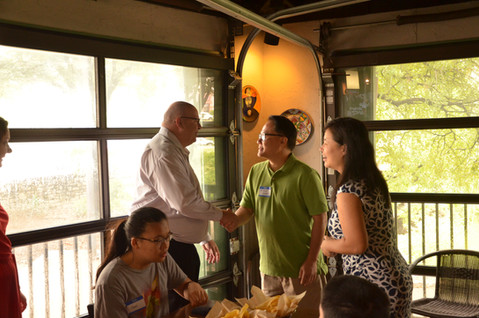YES Brings Light to Business and Networking for Teens
By Li Shen

September 3, 2018-- Both students and presenters are buzzing with energy as they prepare for a seminar that will mark the second meeting of the YES (Youth Entrepreneur Society) program. Around 40 high schoolers ages 13-18 are all ears as speakers Dr. Simon Mak and Mr. Jonathan Alpart introduce crucial concepts on business and the social interactions.
Dr. Mak is the Assoc. Director of Caruth Institute for Entrepreneurship and a professor of Practice in Entrepreneurship at SMU. He begins the talk with a fundamental question: What is an entrepreneur? “Mark Zuckerberg!” “Steve Jobs!” “Bill Gates!”, many of the widely known American businessmen are listed by the audience. However, Mak introduces “one of the world’s most successful companies today, VIPKid”. VIPKid, a Chinese online education firm, offers an American elementary education experience to Chinese students. Founded by two Asian women, it is truly an eye-opener to the fact that anyone can be an entrepreneur.
In a common Chinese household, the belief that education is the easiest path to success is often emphasized, leading to a very “safe” and narrow path for a person’s life. This is why the stereotype that all oriental families want their kids to be doctors, lawyers, and engineers is not completely inaccurate. It might seem stiff, but parents oftentimes merely fear their children putting a career on the line for something that could potentially lead to failure.
Nonetheless, Dr. Mak says that “if your dreams don’t scare you, you’re not dreaming big enough.” Mak stresses that although entrepreneurs might be perceived as greedy or only wanting to work for themselves, it’s important to take on things that challenge or test a person’s risk levels. “In a free-market society, you are rewarded for bringing value to the public.”
Even though the world is perpetually “set up to push you down”, taking such chances could be the tipping point between success and failure.

Young people like Macy Su, a junior at Heritage High School, are already beginning to create. As the president of YES, Macy says that the program’s goal is to offer a unique approach to business leadership opportunities. Although it has only been recently developed, YES has already attracted many students seeking advice and insight into business and life skills.
“Things like this are very insightful, and really offer the chance to make connections with people. It has really inspired me to approach my own business,” says Richard Luo, a member of the program.
Still, starting your own business is only the tip of the iceberg. After creating a corporation or firm, one of the most important parts of making it successful is found in the sales department.
Mr. Alpart’s definition of an entrepreneur is “someone who chooses to do something rather than someone who is told to do something.” As a sales associate of Fathom Realty who had lived in Beijing for nearly 7 years, Alpart believes that forming sincere relationships with people is crucial when it comes to a business.

So, “why do we do things like icebreakers?” The term icebreaker might seem juvenile, like something kids at a summer camp would do, but in reality, it’s a skill that many don’t pay enough attention to. The main purpose of an icebreaker is to make people feel less uncomfortable. Learning to begin conversations with others not only benefits in the professional world but in our everyday lives as well.
Especially in America, two behaviors that people have adopted constantly create conflict: “Independence combined with the desire to be a polite person make things awkward”. These two traits create a strain when attempting to express an idea. This is where an icebreaker might come in to alleviate that stress.
“There are four criteria to a successful icebreaker,” says Mr. Alpart. “The first one is to not be personal.” By not asking someone to evaluate themselves, it is less likely that they will reject your comment. Talking about something immediate in the environment makes sure that both of you have experienced the conversation topic. Along with that, addressing a similarity can create a bond between two speakers. Finally, a little humor ices the cake.
After an icebreaker, it is important to offer to end the conversation. Although this might seem to contradict the purpose of the exchange, opening the option to stop talking shows that you understand that others have an independent life. Create a vague follow-up plan, and move on! This increases comfort levels and lowers the pressure. Mr. Alpart suggests to “meet more strangers and practice making connections.” Put yourself out there and look for something that takes you from your comfort zone.
Mr. Mike Simmons and Mrs. Stacy Simmons from the Frisco Education Foundation offer tips for a social setting as well. Small things like keeping a nametag on the right side of a shirt to remembering names can make all the difference when it comes to interacting with others.
Culture defines what the norm is, but it is important to overcome these norms and learn to take action. Regular education teaches you to sit in a corner cubicle, but having the courage to try teaches you to sit in the CEO’s office.













Comments